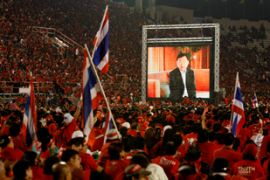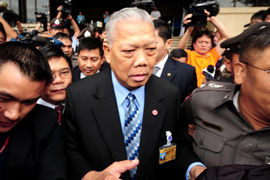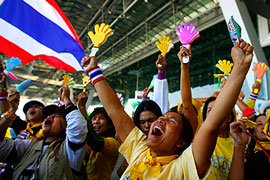Timeline: Thailand crisis
Key events in Thailand’s political crisis.

April 2009: Anti-government protesters demand resignation of Abhisit as they converge on the venue of a summit of the 10 members of Asean (Association of Southeast Asian Nations) and other Asian countries in the beach resort town of Pattaya. They later force the closing of the conference, dealing a major blow to the government.
December 2008: Abhist is named prime minister by parliament after the constitutional court removed from power the People Power Party (PPP) linked to Thaksin.
He succeeds Somchai Wongsawat, Thaksin’s brother-in-law and acting prime minister.
The anointment of Abhisit by parliament comes two days after thousands of opposition supporters gathered in a sports stadium in Bangkok to hear a pre-recorded video message from Thaksin.
| Thai leadership |
|
Mar 2005 – Thaksin re-elected Soon aftewards, members of parliament select Abhisit Vejjajiva as new prime minister. |
Thaksin, whose exact whereabouts are unclear, was based in the UK until the British authorities revoked his visa on November 8.
Somchai was forced from office after a constitutional court ruling on December 3 said the PPP should be disbanded for fraud in the December 2007 general election.
Along with 36 other party members, he was barred from politics for five years.
Supporters of opposition grouping the People’s Alliance for Democracy (PAD) declare a victory over the government following the court ruling and pro-PAD protesters end their siege of Bangkok’s main airports.
Four days later, PPP members reform under the name Puea Thai, which translates as For Thais. They attempt to form a new government and hold on to power.
November: Tens of thousands of PAD supporters protest around the parliament building in Bangkok.
As part of the protests, demonstrators lay siege to the capital’s main airports grounding flights to and from the country.
Somchai declares an emergency at the city’s airports and threatens to use force to remove the protesters.
He later backs down saying the authorities will only negotiate and use non-violent means to resolve the stand-off.
However, the protests are marred by violence with demonstrators injured, and one killed, in an apparent grenade attacks on protesters gathered around the prime minister’s office and a bomb attack at a street market.
By mid-November, Thaksin aides say he is ready to return to Thailand to clear his name. At the same time, he divorces his wife, Pojaman, in what observers believe could be a strategic precursor to his return to active politics.
October: Thaksin is convicted in absentia of breaching conflict of interest laws in connection to a land deal involving his wife. The Thai supreme court hands down a two-year sentence while Thaksin, in exile in London, dismisses the charges as politically motivated.
Deputy prime minister resigns after hundreds of protesters are wounded in police action and a woman is killed in a bomb blast in Bangkok.
September: Samak Sundaravej, PPP leader and prime minister following elections in December 2007, declares a state of emergency in Bangkok after overnight clashes between thousands of pro- and anti-government supporters leave one dead and dozens injured.
 |
| Samak left office after a court ruled he had breached conflict of interest laws [AFP] |
On the same day, September 3, the Thai election commission finds the PPP guilty of buying votes during December’s general election and recommends the supreme court disbands the party.
Tej Bunnag, the Thai foreign minister and a former royal adviser widely regarded as Samak’s link to the palace, resigns.
Thousands defy the state of emergency and continue their occupation of the grounds surrounding the Thai prime minister’s office. However, the Thai army declines to act against the demonstrators despite being given additional powers to restore public order.
Samak appears in court on September 8 charged with breaches of constitutional law after hosting a televised cooking show while in office. He is found guilty the following day and ordered to resign, although the PPP declares it will re-nominate him.
Following renewed demonstrations and protests from opposition and coalition MPs, Samak abandons his attempt to be reinstated as prime minister.
Somchai Wongsawat is named acting prime minister and lifts the state of emergency in Bangkok on September 14 after meeting army chiefs and security officials.
August: Thaksin and his wife go into exile in the UK after failing to appear in court to answer corruption charges. They claim they will not get a fair trial.
At least 35,000 PAD-led protesters raid a TV station, surround three ministries and break into Bangkok’s main government compound in what they say is their “final war” against the government.
By the end of the month, scuffles break out between police and PAD supporters still laying siege to Government House. Protests spread, forcing the temporary closure of three airports at southern tourist hubs and disrupting rail services.
 |
| PAD said the court ruling dissolving the PPP was a victory for the people [GALLO/GETTY] |
July: Court rulings force out three senior government officials – Chiya Sasomsub, the health minister, Noppadon Pattama, the foreign minister, and Yongyut Tiyapairat, the house speaker and PPP deputy leader – from office.
Thaksin’s wife, Pojaman, is convicted on July 31 of tax evasion and released on bail.
Separately, there is a military standoff between Thai and Cambodian forces near the site of a disputed temple along the border. PAD accuses Samak of relinquishing Thai territory to help Thaksin with a business deal in Cambodia.
May: The PAD launches street protests calling for Samak to resign for seeking constitutional amendments they believe are aimed at helping Thaksin.
February: Thaksin, who had been in self-imposed exile for 17 months, gets a hero’s welcome from supporters as he returns to Thailand on February 28 and goes straight to court, where he is released on bail on corruption charges.
Earlier in the month, Samak unveils a cabinet made up of members of a six-party coalition which holds nearly two-thirds of parliamentary seats.
December 23, 2007: Samak leads the PPP to election victory.